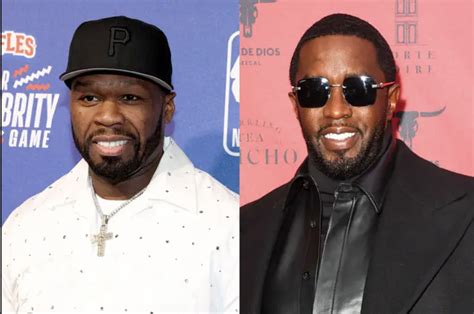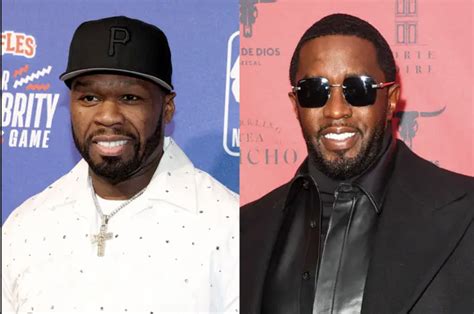
50 Cent ignited social media with a sharp critique of Kanye West’s wife, Bianca Censori, following West’s recent appearance in court documents related to Sean “Diddy” Combs’ ongoing legal battles.
Curtis “50 Cent” Jackson has once again stirred controversy, this time directing his signature brand of commentary towards Bianca Censori, the wife of Kanye West, in the wake of West’s name surfacing in the Sean “Diddy” Combs legal proceedings. The rapper and media mogul took to Instagram to express his views, sparking widespread reaction and debate across social media platforms. 50 Cent’s remarks, known for their bluntness, have intensified the scrutiny surrounding Censori and her association with West, especially given the sensitive nature of the allegations against Combs.
The commentary comes amid swirling controversies involving Sean “Diddy” Combs, with West’s name recently emerging in court documents. Although West is not directly implicated in the accusations against Combs, his association with the music mogul has drawn increased attention, particularly concerning his relationships and associations.
50 Cent’s post featured a photo of Censori accompanied by a caption that quickly went viral. While the exact wording of the caption is crucial, it is important to accurately represent 50 Cent’s sentiments, without sensationalizing or misinterpreting his intended message. “I’m only saying what everybody else is thinking,” 50 Cent reportedly stated, suggesting his remarks reflect a broader public sentiment regarding Censori’s appearance and public image.
The reaction to 50 Cent’s post has been swift and varied. Some social media users have echoed his sentiments, finding humor or agreement in his observations. Others have criticized his remarks as being insensitive and perpetuating harmful stereotypes, particularly regarding women’s appearances. The debate highlights ongoing discussions about celebrity culture, social media commentary, and the responsibility of public figures to be mindful of the impact of their words.
This is not the first time 50 Cent has used his platform to comment on topical issues and personalities. His outspoken nature has often placed him at the center of controversies, earning him both praise and criticism. Similarly, Kanye West and Bianca Censori have faced their fair share of public scrutiny, with their unconventional style and public displays often generating headlines.
The intersection of these personalities and events underscores the complex dynamics of celebrity culture and the pervasive influence of social media in shaping public perception. As the legal proceedings involving Sean Combs continue to unfold, and as West and Censori navigate their public image, the commentary from figures like 50 Cent adds another layer of complexity to an already intricate narrative.
The incident also brings into focus the broader implications of social media commentary. While platforms like Instagram provide opportunities for public figures to connect with their audiences, they also create spaces for unfiltered opinions that can have far-reaching consequences. The challenge lies in finding a balance between free expression and responsible communication, particularly when addressing sensitive topics and individuals.
The ongoing saga involving Sean Combs, Kanye West, Bianca Censori, and 50 Cent serves as a microcosm of the larger debates surrounding celebrity culture, social responsibility, and the power of social media in the 21st century. As the story continues to evolve, it will undoubtedly spark further discussion and reflection on these important issues.
Contextual Background
To fully understand the dynamics at play, it’s important to delve deeper into the background of each individual involved and the circumstances that have led to this point.
-
50 Cent: Curtis Jackson, known professionally as 50 Cent, rose to prominence in the early 2000s with his debut album “Get Rich or Die Tryin’.” Beyond his successful music career, he has established himself as a businessman, actor, and television producer. He is known for his direct and often provocative commentary on social media, which has garnered both attention and controversy. 50 Cent’s outspoken nature is a defining aspect of his public persona.
-
Kanye West: Now legally known as Ye, is one of the most influential and controversial figures in modern music and fashion. His career has been marked by groundbreaking albums, innovative fashion designs, and numerous public controversies. West’s outspoken views on politics, culture, and society have often placed him at the center of media attention. His marriage to Bianca Censori has further amplified public interest in his personal life.
-
Bianca Censori: An architect and designer, Bianca Censori’s association with Kanye West has thrust her into the spotlight. Her unconventional fashion choices and public appearances with West have made her a frequent subject of media coverage and social media commentary. Censori’s background in architecture adds an interesting dimension to her public image, contrasting with the often superficial nature of celebrity culture.
-
Sean “Diddy” Combs: Sean Combs, also known as Diddy, is a prominent figure in the entertainment industry, with a career spanning music, fashion, and business. He has been instrumental in shaping the sound and style of hip-hop culture. However, recent allegations of sexual assault and misconduct have cast a shadow over his legacy, leading to multiple lawsuits and investigations.
The Diddy Controversy
The legal troubles surrounding Sean Combs stem from multiple allegations of sexual assault, misconduct, and trafficking. These accusations, brought forth by several individuals, paint a disturbing picture of Combs’ alleged behavior over several decades. The lawsuits have prompted investigations by law enforcement agencies and have led to a significant decline in Combs’ public image.
Although Kanye West is not directly implicated in the allegations against Combs, his association with the music mogul has drawn increased scrutiny. West has collaborated with Combs on various music projects and has publicly expressed admiration for him. This connection has led to questions about West’s awareness of Combs’ alleged misconduct and his stance on the accusations.
50 Cent’s History of Commentary
50 Cent has a long history of using social media to express his opinions on a wide range of topics, often in a provocative and unfiltered manner. He has engaged in feuds with other celebrities, commented on political issues, and shared his views on social trends. His commentary has often sparked controversy, drawing both criticism and support.
50 Cent’s remarks about Bianca Censori are consistent with his established pattern of using social media to voice his opinions, regardless of the potential backlash. His willingness to speak his mind, even when it is unpopular or controversial, has become a defining aspect of his public persona.
Social Media Reaction
The reaction to 50 Cent’s post about Bianca Censori has been diverse and impassioned. Some social media users have defended his right to express his opinion, arguing that his remarks were simply humorous observations. Others have condemned his comments as being insensitive, misogynistic, and harmful.
The debate surrounding 50 Cent’s post highlights the complex dynamics of social media commentary. While platforms like Instagram provide opportunities for free expression, they also create spaces for unfiltered opinions that can have far-reaching consequences. The challenge lies in finding a balance between freedom of speech and responsible communication.
Ethical Considerations
The incident raises several ethical considerations about the role of public figures in shaping public discourse. Celebrities like 50 Cent have a significant platform and influence, and their words can have a profound impact on their followers. It is important for public figures to be mindful of the potential consequences of their commentary, particularly when addressing sensitive topics and individuals.
The ethical considerations also extend to the media’s coverage of the incident. While it is important to report on newsworthy events, it is equally important to avoid sensationalizing or perpetuating harmful stereotypes. The media has a responsibility to provide accurate and balanced coverage, while also being mindful of the potential impact on the individuals involved.
Legal Ramifications
While 50 Cent’s remarks about Bianca Censori are unlikely to result in legal action, the incident highlights the potential legal ramifications of social media commentary. Defamatory statements, hate speech, and threats can all be grounds for legal action, even if they are made online.
Public figures must be aware of the legal boundaries of free speech and avoid making statements that could expose them to legal liability. The legal ramifications of social media commentary underscore the importance of responsible communication in the digital age.
The Bigger Picture
The controversy surrounding 50 Cent’s remarks about Bianca Censori is part of a larger conversation about celebrity culture, social media, and the responsibility of public figures. As social media continues to evolve, it is important to develop guidelines and norms for online communication that promote respect, empathy, and understanding.
The incident also underscores the need for critical thinking and media literacy. Social media users should be able to evaluate the credibility of information and be aware of the potential biases and agendas that may be influencing online content. By promoting critical thinking and media literacy, we can create a more informed and responsible online environment.
Long-Term Implications
The long-term implications of the controversy are difficult to predict. However, the incident is likely to have a lasting impact on the individuals involved and on the broader conversation about celebrity culture and social media.
50 Cent’s remarks may further solidify his reputation as a controversial figure, while also raising questions about his judgment and sensitivity. Bianca Censori may face increased scrutiny and criticism, as her public image continues to evolve. The incident may also prompt a broader discussion about the responsibility of public figures to be mindful of the impact of their words.
In conclusion, the controversy surrounding 50 Cent’s remarks about Bianca Censori is a complex and multifaceted issue with far-reaching implications. It underscores the power of social media to shape public opinion, the responsibility of public figures to be mindful of their words, and the need for critical thinking and media literacy in the digital age.
Frequently Asked Questions (FAQ)
-
What exactly did 50 Cent say about Bianca Censori?
- 50 Cent posted a photo of Bianca Censori on his Instagram account accompanied by a caption making critical remarks about her appearance and fashion choices. Specific quotes from the original source are necessary to accurately represent his statement, but reports indicate he suggested his opinions reflected common thoughts, stating, “I’m only saying what everybody else is thinking.” Without the exact quote, it is essential not to misrepresent or exaggerate his comments.
-
Why is Kanye West’s name being mentioned in connection with the Sean “Diddy” Combs case?
- Kanye West’s name surfaced in court documents related to Sean “Diddy” Combs due to their past professional and personal associations. While West is not directly accused of any wrongdoing, his relationship with Combs has brought him into the periphery of the ongoing legal proceedings. This connection has prompted media scrutiny regarding West’s awareness and stance on the accusations against Combs.
-
How has the public reacted to 50 Cent’s comments?
- The public reaction to 50 Cent’s comments has been mixed. Some individuals have supported his remarks, finding them humorous or agreeing with his sentiments. Others have criticized his comments as insensitive, misogynistic, and perpetuating harmful stereotypes. The differing reactions highlight the ongoing debate about celebrity commentary and social media responsibility.
-
What is Bianca Censori’s background, and how did she become famous?
- Bianca Censori is an architect and designer who gained public attention primarily through her marriage to Kanye West. Her unconventional fashion choices and public appearances with West have made her a frequent subject of media coverage and social media commentary. Before her association with West, Censori worked as an architectural designer, bringing a professional background outside the entertainment industry to her current public persona.
-
What are the broader implications of this controversy involving 50 Cent, Kanye West, and Bianca Censori?
- The controversy underscores several broader issues, including the power of social media in shaping public opinion, the responsibility of public figures to be mindful of their words, and the need for critical thinking and media literacy in the digital age. It also highlights the complex dynamics of celebrity culture and the potential for social media commentary to have far-reaching consequences.
Extended Analysis: Deeper Dive into the Key Issues
To provide a comprehensive understanding, let’s dissect the key elements of this unfolding narrative:
1. The Culture of Celebrity Commentary:
- The Rise of “Clout Chasing”: Social media has created an environment where attention is currency. Celebrities often engage in controversial commentary to generate buzz and increase their visibility, even if it means attracting negative attention. This “clout chasing” behavior can be detrimental to public discourse and contribute to a toxic online environment.
- The Erosion of Boundaries: The lines between public and private life have become increasingly blurred, with celebrities often sharing intimate details of their lives on social media. This can lead to a sense of entitlement among fans and followers, who may feel justified in expressing their opinions, regardless of how insensitive or intrusive they may be.
- The Echo Chamber Effect: Social media algorithms often reinforce existing beliefs and biases, creating echo chambers where users are only exposed to information that confirms their perspectives. This can lead to increased polarization and a lack of empathy for those with different viewpoints.
2. The Objectification of Women:
- The Male Gaze: 50 Cent’s comments about Bianca Censori reflect the pervasive “male gaze” in society, where women are often viewed as objects of desire and their worth is judged based on their physical appearance. This can lead to the sexualization and objectification of women, contributing to harmful stereotypes and gender inequality.
- Body Shaming: Comments about a woman’s appearance can have a devastating impact on her self-esteem and mental health. Body shaming, whether it’s directed at celebrities or everyday individuals, can perpetuate unrealistic beauty standards and contribute to a culture of self-doubt and insecurity.
- The Double Standard: Women are often held to higher standards of beauty and behavior than men, and they are more likely to be criticized for their appearance and lifestyle choices. This double standard can be particularly damaging in the context of celebrity culture, where women are constantly under scrutiny.
3. The Ethics of Social Media Commentary:
- Freedom of Speech vs. Responsibility: While freedom of speech is a fundamental right, it is not absolute. Public figures have a responsibility to be mindful of the impact of their words, particularly when addressing sensitive topics and individuals. Incitement to violence, defamation, and hate speech are all examples of speech that is not protected by law.
- The Power of Influence: Celebrities have a significant platform and influence, and their words can have a profound impact on their followers. It is important for public figures to use their influence responsibly and to avoid perpetuating harmful stereotypes or promoting hate speech.
- The Need for Empathy: Social media can be a powerful tool for connecting with others and building community. However, it is important to approach online interactions with empathy and respect. Before posting a comment, consider how it might affect the person on the receiving end.
4. The Role of the Media:
- Sensationalism: The media often sensationalizes celebrity controversies to attract viewers and readers. This can lead to a distortion of the facts and a focus on sensationalism over substance.
- Bias: The media can be influenced by various biases, including political, economic, and social biases. It is important to be aware of these biases when consuming news and to seek out multiple sources of information.
- Responsibility: The media has a responsibility to provide accurate and balanced coverage of celebrity controversies. It is also important to avoid perpetuating harmful stereotypes or contributing to a toxic online environment.
5. The Importance of Critical Thinking and Media Literacy:
- Evaluating Sources: It is important to evaluate the credibility of information before sharing it on social media. Consider the source of the information, the author’s credentials, and the potential biases that may be influencing the content.
- Identifying Bias: Be aware of the potential biases that may be present in news and social media content. Consider the perspective of the author and the audience they are trying to reach.
- Thinking Critically: Don’t accept information at face value. Ask questions, do your own research, and form your own opinions.
By understanding these key issues, we can gain a deeper appreciation of the complexities of the controversy surrounding 50 Cent’s remarks about Bianca Censori and the broader implications for celebrity culture and social media.
Moving Forward: A Call for Responsible Engagement
This incident serves as a stark reminder of the need for responsible engagement in the digital age. It calls for a collective effort from celebrities, media outlets, and individuals to promote a more respectful and empathetic online environment.
Recommendations for Celebrities:
- Think Before You Post: Consider the potential impact of your words before sharing them on social media.
- Use Your Influence Responsibly: Use your platform to promote positive messages and to advocate for social justice.
- Be Mindful of Your Audience: Remember that your words can have a profound impact on your followers.
- Engage in Constructive Dialogue: Use social media as a tool for promoting understanding and empathy.
Recommendations for Media Outlets:
- Provide Accurate and Balanced Coverage: Avoid sensationalizing celebrity controversies and focus on providing accurate and balanced reporting.
- Be Aware of Bias: Be mindful of the potential biases that may be influencing your coverage.
- Promote Responsible Online Behavior: Use your platform to advocate for responsible online behavior and to discourage hate speech and cyberbullying.
Recommendations for Individuals:
- Be Critical of the Information You Consume: Evaluate the credibility of information before sharing it on social media.
- Engage in Respectful Dialogue: Treat others with respect, even if you disagree with their opinions.
- Report Abuse: If you see something that violates social media guidelines, report it to the platform.
- Promote Positive Content: Share positive and uplifting content to counter the negativity that often pervades social media.
By embracing these recommendations, we can create a more positive and constructive online environment that promotes respect, empathy, and understanding. The controversy surrounding 50 Cent’s remarks about Bianca Censori serves as a call to action, urging us to be more mindful of our words and actions in the digital age.
Ultimately, the responsibility lies with each of us to create a better online world. By engaging responsibly and thoughtfully, we can contribute to a more positive and constructive online environment for all.









